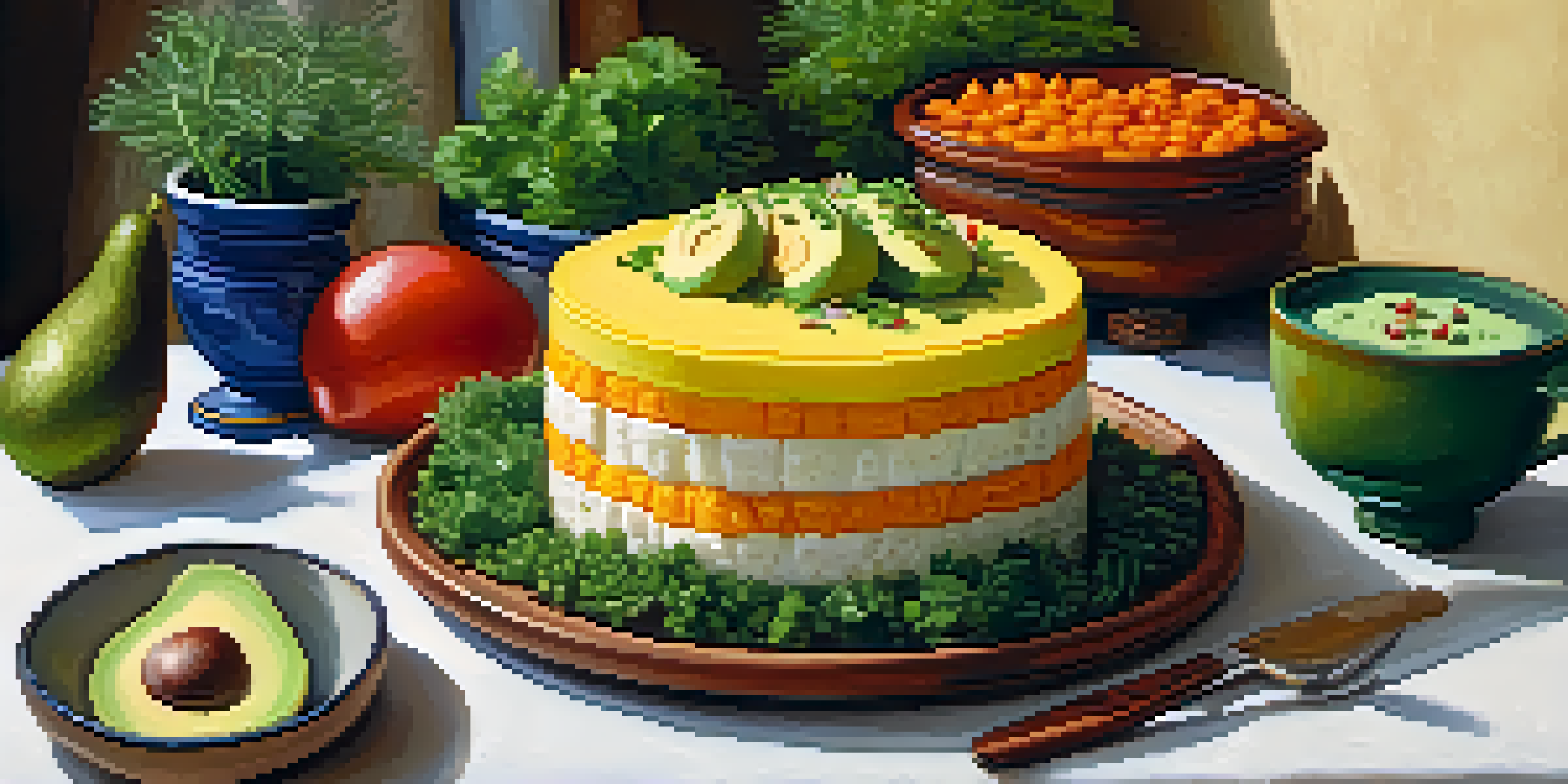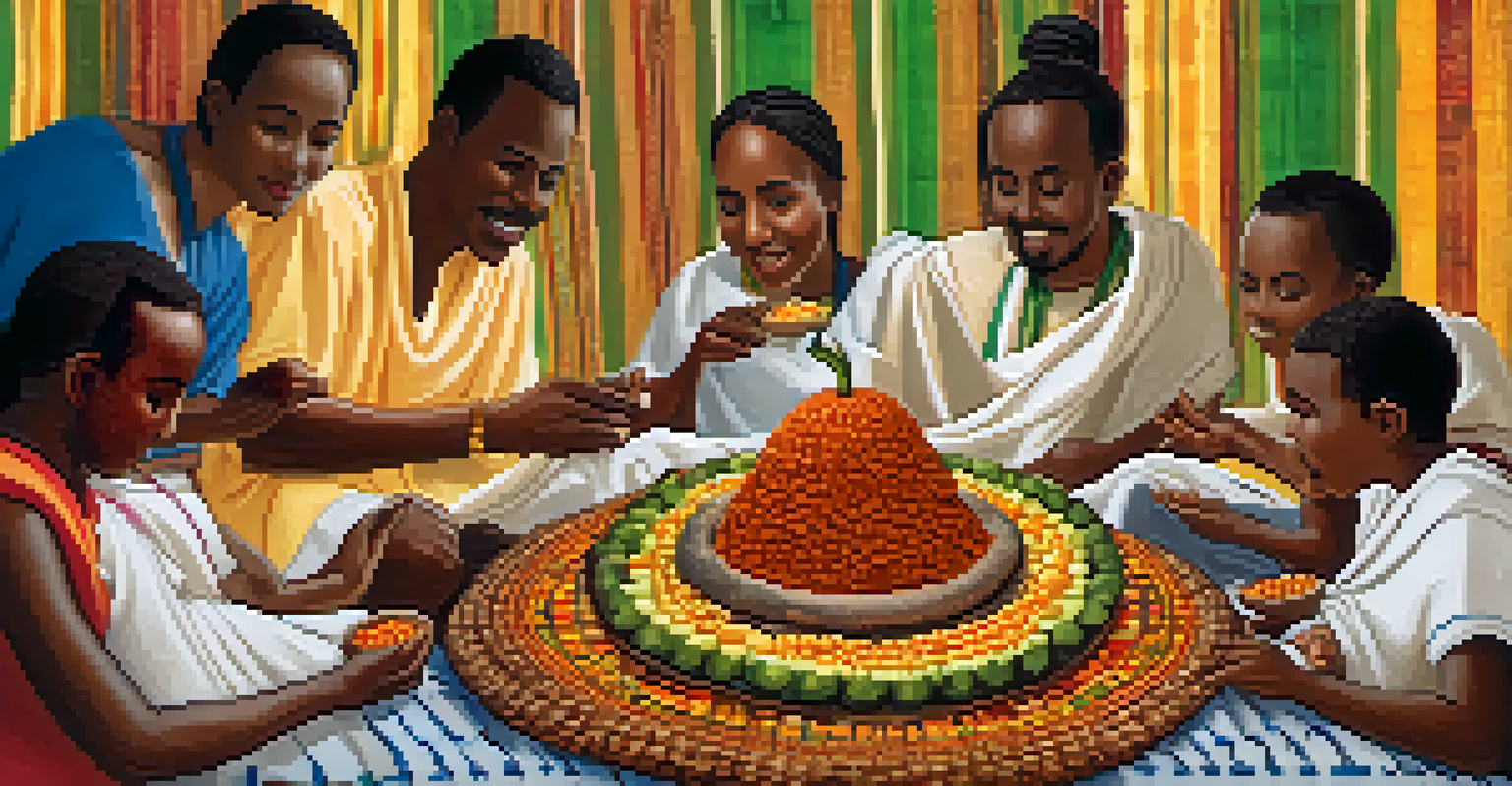Vegan Dishes from Indigenous Cultures: A Global Perspective

The Roots of Indigenous Vegan Cuisine
Indigenous cuisines often feature plant-based ingredients that have been cultivated for generations. These dishes are deeply connected to the land, utilizing local produce, grains, and legumes. For example, many Native American tribes traditionally relied on corn, beans, and squash, known as the 'Three Sisters,' which not only provide a balanced diet but also reflect sustainable farming practices.
Eating is an agricultural act.
In addition to being nutritious, indigenous vegan dishes tell stories. They embody cultural values, seasonal changes, and communal meals, creating a rich tapestry of flavors and traditions. This connection to nature fosters a respect for the environment, emphasizing the importance of sustainability in food practices.
Many of these dishes have stood the test of time, adapting to modern tastes while retaining their historical significance. By exploring these vegan options, we can appreciate the wisdom of indigenous cultures and their deep understanding of plant-based nutrition.
South American Vegan Wonders
In South America, indigenous cultures have long embraced a variety of vegan dishes that showcase local ingredients. For instance, the Andean people have cultivated quinoa for centuries, often preparing it in vibrant dishes accompanied by vegetables and herbs. Dishes like quinoa stew highlight the grain's versatility and nutritional benefits, making it a staple in many households.

Another popular dish is 'Causa,' a Peruvian dish made from mashed yellow potatoes mixed with lime and chili, often layered with avocado and vegetables. This dish not only boasts flavors but also reflects the resourcefulness of indigenous communities in maximizing their harvest.
Indigenous Vegan Cuisine's Roots
Indigenous vegan dishes reflect a deep connection to the land, utilizing local ingredients that promote sustainability and cultural heritage.
These dishes are more than just food; they represent a connection to the land and celebrate the cultural heritage of the people. By trying these vegan recipes, we gain a taste of South America's rich traditions and biodiversity.
North American Indigenous Plant-Based Staples
North America's indigenous populations offer a wealth of plant-based dishes that highlight local flora. Ingredients like wild rice, berries, and various vegetables are central to many traditional meals. For example, the Ojibwe people often prepare wild rice with mushrooms and cranberries, creating a dish that is both flavorful and deeply rooted in their heritage.
Food is not just what you eat; it's a reflection of your culture and community.
Furthermore, the use of foraged plants plays a significant role in these cuisines. Many tribes have long histories of gathering wild greens and herbs, which are often incorporated into soups or stews. This practice not only promotes sustainability but also enhances the nutritional profile of their meals.
Exploring these plant-based staples allows us to appreciate the ingenuity and resilience of North American indigenous cultures. Their culinary traditions remind us of the importance of honoring local ecosystems and utilizing seasonal ingredients.
African Indigenous Vegan Delicacies
Across Africa, indigenous communities have developed a plethora of vegan dishes that celebrate local ingredients and cooking techniques. For instance, in Ethiopia, injera—a sourdough flatbread made from teff—is often served with an array of spicy lentil stews and vegetable dishes. This communal way of eating emphasizes sharing and togetherness, which is central to many African cultures.
In West Africa, dishes like jollof rice are frequently prepared with an abundance of vegetables and spices, creating a flavorful and colorful meal. The use of ingredients such as tomatoes, peppers, and onions showcases the region's agricultural diversity and culinary creativity.
Global Lessons in Sustainability
Exploring indigenous vegan recipes encourages modern cooking practices that prioritize local, seasonal ingredients for a healthier food system.
These dishes not only nourish the body but also serve as a testament to the rich cultural heritage of African communities. By incorporating these vegan options into our diets, we can celebrate the flavors and traditions of the continent.
Asian Indigenous Vegan Traditions
Asia boasts a rich tapestry of indigenous vegan dishes that vary widely across regions. In India, for example, the traditional cuisine is heavily plant-based, with dishes like dal (lentil soup) and sabzi (vegetable curry) being staples in many households. These meals are often seasoned with a variety of spices, making them both flavorful and aromatic.
Similarly, in Japan, indigenous plant-based dishes such as miso soup and pickled vegetables reflect the country's deep connection to nature. Seasonal ingredients play a crucial role, with many meals celebrating the bounty of each season, showcasing the respect for the environment inherent in Japanese culture.
These diverse cuisines highlight the importance of plant-based eating in Asian cultures. By embracing these vegan traditions, we not only expand our palates but also deepen our understanding of the cultural significance behind these dishes.
Oceania's Plant-Based Heritage
In Oceania, indigenous cultures have cultivated a variety of plant-based dishes that reflect their unique landscapes and resources. For instance, the Māori of New Zealand often prepare dishes using kumara (sweet potato) alongside seasonal vegetables. These meals emphasize the connection between food and community, often enjoyed during gatherings and celebrations.
Similarly, in the Pacific Islands, dishes like taro and breadfruit are central to their diets, showcasing the importance of local agriculture. These ingredients are often prepared in traditional ways, such as steaming or baking, allowing their natural flavors to shine.
Celebrating Cultural Diversity
Incorporating indigenous vegan dishes into our diets fosters appreciation for diverse culinary traditions and supports the preservation of these legacies.
Exploring these plant-based options from Oceania allows us to appreciate the deep ties to land and culture that indigenous peoples maintain. Each dish tells a story, reminding us of the importance of preserving culinary traditions.
The Global Impact of Indigenous Vegan Dishes
As we explore vegan dishes from indigenous cultures around the world, we uncover not just delicious flavors but also valuable lessons in sustainability and respect for nature. These cuisines are often built on principles of using local, seasonal ingredients, which can inspire modern cooking practices. By integrating these principles into our diets, we can contribute to a more sustainable food system.
Moreover, these dishes celebrate biodiversity, encouraging us to appreciate the variety of plants available to us. This focus on plant-based eating can have a positive impact on our health and the environment, aligning with global movements toward healthier lifestyles.

By embracing indigenous vegan recipes, we not only nourish ourselves but also honor the traditions and wisdom of these cultures. This connection fosters a greater appreciation for the culinary heritage that exists around the globe.
Embracing Indigenous Vegan Cooking Today
Incorporating indigenous vegan dishes into our modern kitchens can be a rewarding experience. By experimenting with traditional recipes, we can discover new flavors and cooking techniques that enrich our culinary repertoire. For example, trying your hand at making injera or preparing a quinoa stew can connect you to the stories behind these dishes.
Moreover, supporting indigenous food systems by sourcing ingredients from local farmers markets or indigenous producers helps sustain these traditions. This not only promotes cultural heritage but also strengthens community ties and encourages sustainable practices.
Ultimately, embracing these culinary traditions allows us to celebrate diversity in our diets while fostering a deeper understanding of the cultural significance behind our food. By doing so, we contribute to the preservation of these invaluable culinary legacies.